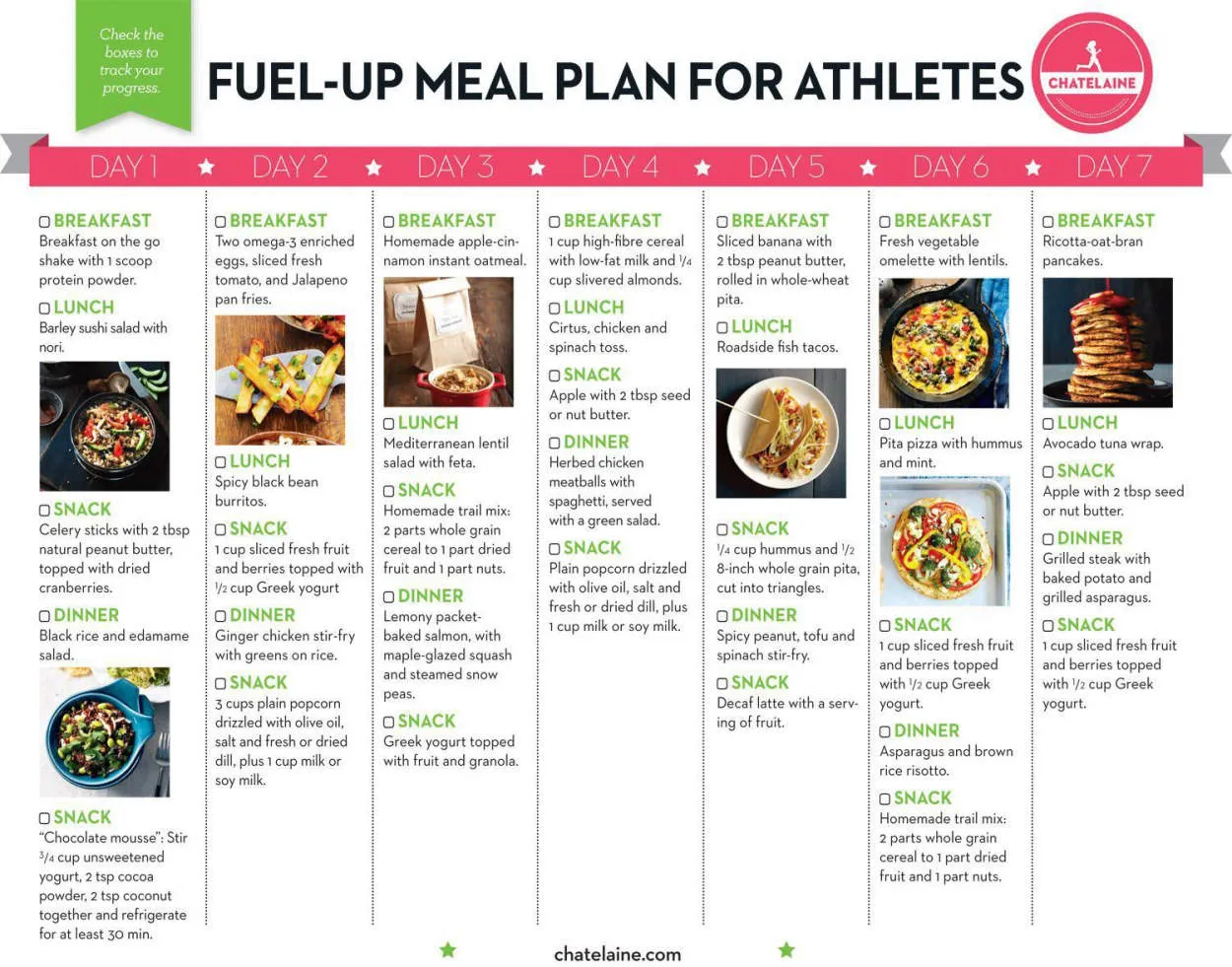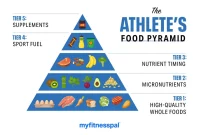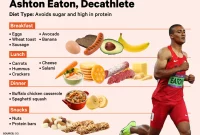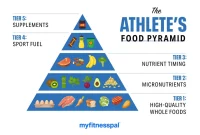Eating for Endurance: Nutrition Tips for Long-Distance Athletes
Dietary Foundations for Endurance Training
Proper nutrition plays a vital role in the performance and overall success of long-distance athletes. The following are essential dietary foundations for endurance training:
1. Balanced Macronutrients
Achieving the right balance of macronutrients is crucial for endurance athletes. Carbohydrates provide the main source of fuel for prolonged exercise, so it is important to consume complex carbohydrates such as whole grains, fruits, and vegetables. Additionally, protein aids in muscle repair and recovery, while healthy fats provide sustained energy. Aim for a well-rounded diet that includes a mix of all three macronutrients.
2. Sufficient Caloric Intake
Endurance training requires athletes to consume enough calories to support their high energy demands. Striking the right balance is essential – consuming too few calories can lead to fatigue and poor performance, while overeating can hinder training progress. Consult with a sports nutritionist to determine your individual calorie needs based on training volume and intensity.
3. Hydration
Staying properly hydrated is crucial for endurance athletes. Dehydration can significantly impact performance and increase the risk of injury. Drink water consistently throughout the day and during training sessions. Consider using sports drinks during longer workouts to replenish electrolytes lost through sweat.
4. Micronutrients and Antioxidants
Ensure an adequate intake of micronutrients and antioxidants to support overall health and recovery. Include a variety of colorful fruits and vegetables in your diet to provide essential vitamins, minerals, and antioxidants. Consider taking a daily multivitamin to fill any potential nutrient gaps.
5. Timing and Individualization
Timing your meals and snacks strategically can optimize energy levels and enhance performance. Experiment with the timing of your pre- and post-workout meals to find what works best for you. Additionally, every athlete is unique, so it’s important to personalize your nutrition plan based on your specific needs and preferences.
Remember, nutrition is not a one-size-fits-all approach. It is crucial to consult with a registered dietitian or sports nutritionist who can create a customized plan tailored to your individual requirements and goals.
Carb Loading: Myths and Realities
When it comes to eating for endurance, one commonly discussed strategy is carb loading. Long-distance athletes often rely on this practice to fuel themselves for their grueling workouts and competitions. However, there are many myths and misconceptions surrounding carb loading that can lead athletes astray.
Myth: Carb Loading Means Eating as Many Carbs as Possible
Contrary to popular belief, carb loading does not mean consuming unlimited amounts of carbohydrates. While it’s true that carbohydrates are a crucial fuel source for endurance exercise, excessive consumption can result in digestive issues and hinder performance. The key is to strategically increase carbohydrate intake while maintaining a balanced diet.
Reality: Timing is Everything
The timing of carb loading is a crucial element. It is recommended to start gradually increasing carbohydrate intake in the days leading up to a long-distance event. This allows the body to store glycogen, the primary energy source for endurance exercise. However, overloading on carbs the night before a race may result in gastrointestinal distress and discomfort.
Myth: Only Simple Carbs Matter
Another misconception is that carb loading should rely solely on simple carbohydrates like sugary drinks or white bread. While these can provide quick energy, it’s important to include complex carbohydrates such as whole grains, fruits, and vegetables to ensure sustained energy levels and proper nutrition.
Reality: Individual Needs Vary
Each athlete has unique nutritional requirements, including the amount and timing of carbohydrate intake. Factors such as body composition, training intensity, and personal preferences can influence an individual’s carb loading strategy. Experimenting with different approaches during training can help athletes determine what works best for them.
Myth: Carb Loading Works for Everyone
While carb loading can be beneficial for endurance athletes, it may not be necessary for everyone. Those engaging in shorter-duration exercises or less intense workouts may not need the same level of carbohydrate replenishment. It’s important to tailor nutrition strategies to individual goals and training regimens.
Reality: Balanced Nutrition is Key
Ultimately, carb loading should be part of a well-rounded nutrition plan for long-distance athletes. It’s important to focus on all macronutrients, including adequate protein and healthy fats, along with vitamins and minerals. A balanced diet supports overall performance, recovery, and overall health.
The Role of Fats in Long-Distance Sports
In the world of long-distance sports, nutrition plays a crucial role in optimizing performance and endurance. While carbohydrates are often emphasized, the role of fats should not be overlooked. Fats serve as an important energy source and have several benefits for long-distance athletes.
Energy Reserve
Fats provide a concentrated source of energy, offering more than twice the amount of energy per gram compared to carbohydrates or proteins. During long-distance activities, such as running a marathon or participating in an endurance cycling race, the body relies on stored fats as a fuel source. By including healthy fats in their diet, athletes can ensure an adequate energy reserve that can be utilized during intense physical exertion.
Slow Release of Energy
Unlike carbohydrates, which provide quick bursts of energy, fats offer a slower and more sustained release of energy. This is particularly beneficial for endurance sports, as it helps prevent sudden drops in energy levels during prolonged activities. Including sources of healthy fats, such as avocados, nuts, and seeds, in pre-workout or pre-competition meals can help athletes maintain a steady energy supply throughout their training or event.
Enhanced Endurance
Fats also contribute to enhanced endurance by promoting the efficient utilization of oxygen. During prolonged exercises, the body relies on both carbohydrates and fats for energy. When the body becomes fatigued and glycogen stores (carbohydrate reserves) start to deplete, the reliance on fat increases. Well-trained long-distance athletes who have adapted their bodies to burn fat efficiently can sustain their performance for longer periods, thanks to the contribution of fats.
Essential Fat-Soluble Vitamins
Fats are carriers of essential fat-soluble vitamins, including vitamins A, D, E, and K. These vitamins are important for maintaining overall health and performance. Fat intake is necessary to ensure the absorption and utilization of these essential vitamins, which have various roles such as boosting immunity, facilitating calcium absorption, and aiding in the repair of muscle tissue.
It is important for long-distance athletes to incorporate a balanced diet that includes an appropriate amount of healthy fats. Including sources like avocados, nuts, seeds, olive oil, and fatty fish can provide the necessary fats for optimal endurance performance. Remember, though, that moderation is key, and athletes should consult with a sports nutritionist to determine their specific dietary requirements.
+
Hydration Strategies for Endurance Athletes
Proper hydration is crucial for endurance athletes, as it directly affects performance and recovery. Here are some effective hydration strategies to keep in mind:
1. Start Hydrating Early
Begin hydrating well before your workout or race to ensure your body is adequately hydrated. Aim to drink about 17 to 20 ounces of water two to three hours before exercise.
2. Maintain Fluid Balance
During prolonged endurance activities, such as long-distance running or cycling, it’s essential to replace fluid losses to maintain optimal hydration. Drink fluids at regular intervals, typically every 15 to 20 minutes, to ensure you stay adequately hydrated.
3. Consume Electrolytes
Electrolytes, such as sodium, potassium, and magnesium, play a vital role in maintaining fluid balance and preventing cramping. Consider consuming sports drinks or electrolyte-rich foods to replenish these essential minerals.
4. Listen to Your Body
Each athlete’s hydration needs vary, so it’s important to listen to your body’s signals. Pay attention to thirst cues and note any signs of dehydration, such as dark urine or fatigue, to adjust fluid intake accordingly.
5. Plan for Intense Workouts
If you have a particularly intense or prolonged training session coming up, plan your hydration strategy accordingly. Consider consuming sports drinks with carbohydrates and electrolytes to optimize fluid absorption and fuel your performance.
6. Monitor Hydration Post-Workout
After exercising, replenishing fluids is key to support recovery. Weigh yourself before and after your workout to estimate fluid losses. Aim to consume 16 to 24 ounces of fluid for each pound lost during exercise.
Remember, hydration is a vital component of an endurance athlete’s nutrition plan. Implement these strategies to enhance your performance and ensure you maintain optimal fluid balance throughout your training and races.
Supplement Use in Endurance Sports
When it comes to participating in endurance sports such as long-distance running, cycling, or triathlons, proper nutrition plays a crucial role in improving performance and aiding recovery. Alongside a balanced diet, some athletes turn to supplements to enhance their endurance and maximize their athletic potential. However, understanding the benefits and risks associated with supplement use is essential.
1. Energy Supplements
Energy supplements, such as carbohydrate gels or drinks, are commonly used by endurance athletes during training sessions or competitions. These supplements provide a quick source of easily digestible carbohydrates, helping to maintain blood sugar levels and delay fatigue. However, it is important to use them judiciously and practice proper hydration to avoid gastrointestinal issues.
2. Electrolyte Replenishment
During prolonged endurance activities, electrolytes, including sodium, potassium, and magnesium, are lost through sweat. Some athletes opt for electrolyte-rich supplements or specialized sports drinks to replenish these minerals. However, it is crucial to balance electrolyte intake and not exceed recommended amounts, as high levels can lead to health complications.
3. Protein Supplements
Protein supplements are often embraced by endurance athletes, as they aid in muscle repair and recovery. While protein plays a vital role in optimizing athletic performance, it is usually attainable through a well-rounded diet that includes lean meats, fish, dairy, and plant-based protein sources. Excessive reliance on supplements may not yield substantial benefits beyond what a balanced diet already provides.
4. Antioxidants and Anti-inflammatory Supplements
Endurance athletes frequently face oxidative stress and inflammation due to the demands placed on their bodies. Some supplements, like vitamins C and E, or compounds like omega-3 fatty acids, are believed to possess antioxidant and anti-inflammatory properties. However, it is crucial to obtain these nutrients from whole foods whenever possible and consult a healthcare professional before considering supplements.
In conclusion, while supplements can be a useful addition to an endurance athlete’s regimen, they should never replace a well-rounded and balanced diet. It is important for athletes to educate themselves about the potential benefits and risks of different supplements, and to remember that individual needs may vary. Consulting with a registered dietitian or sports nutritionist is advisable to ensure optimal performance and health.
Conclusion
In conclusion, nutrition plays a crucial role in the performance of long-distance athletes. To enhance endurance, athletes should focus on consuming a well-balanced diet consisting of carbohydrates, protein, healthy fats, and hydration. It is also important to consider individual needs and preferences while fueling the body for optimal performance. By following these nutrition tips, long-distance athletes can maximize their performance and achieve their goals.




